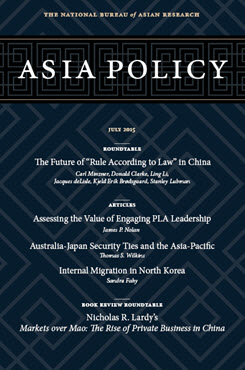Internal Migration in North Korea
Preparation for Governmental Disruption
This article proposes that preparation for internal migration in North Korea, in the case of governmental disruption, will ameliorate humanitarian concerns inside the country while also providing disincentives for outward migration into neighboring countries.
EXECUTIVE SUMMARY
MAIN ARGUMENT
Major governmental disruption in North Korea could produce internal migration, resulting in critical humanitarian needs for large portions of the population. Standard regional concerns focus on mass refugee flows. Efforts to stem the flow of outward migration by China and South Korea could increase humanitarian concerns inside the North, bottling up the population. Careful preparation must address the humanitarian needs of internal migrants so as to ameliorate suffering and discourage outward migration. Skillful humanitarian preparation and implementation—namely the creation of magnet hubs for humanitarian relief, the dissemination of information, and access to telecommunications—will ameliorate the needs of migrants while also incentivizing migrants to remain within the country.
POLICY IMPLICATIONS
- The focus of the U.S., China, and South Korea on refugee flows from North Korea will not result in adequate or strategic preparedness for collapse scenarios.
- How South Korea identifies and addresses the needs of internally migrating populations in North Korea will have the double benefit of ameliorating humanitarian crises and reducing the likelihood of out-migration.
- Existing South Korean and European humanitarian relief operations within North Korea could be ear-marked for scaling up and expansion to create magnet hubs with access to material resources, information, and telecommunications in the case of governmental disruption.
- Proper humanitarian preparation for internal migration in North Korea by China, South Korea, and countries with geopolitical interests in the region, such as Japan and the U.S., will help avoid a buildup of humanitarian crises internally.
About Asia Policy
Asia Policy is a peer-reviewed scholarly journal presenting policy-relevant academic research on the Asia-Pacific that draws clear and concise conclusions useful to today’s policymakers. Asia Policy is published quarterly in January, April, July, and October and accepts submissions on a rolling basis. Learn more


